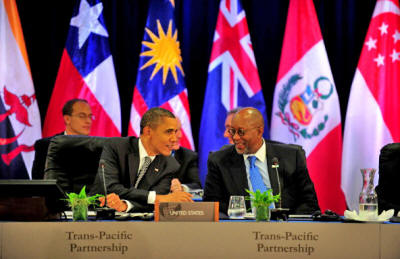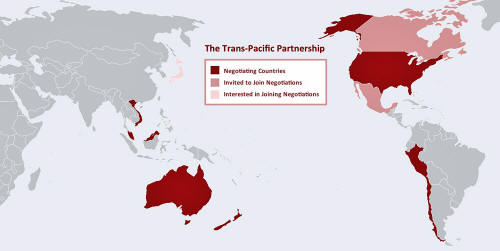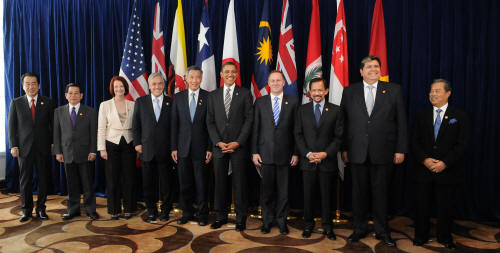|
June 21, 2012 from CommonDreams Website
during a meeting with Trans Pacific Partnership (TPP) leaders at the Asia-Pacific Economic Cooperation summit on November 12, 2011. (Photo by JIM WATSON/AFP/Getty Images)
You might think corporate money corrupts our
political system, but the international trade system is where money really
talks.
The pact currently in negotiations, covering,
...aims to establish a new trade regime that
could intrude on domestic laws that affect millions of workers and
consumers, from their weekly paycheck to their prescription medicines. A summit with leaders of the member states of the Trans-Pacific Strategic Economic Partnership Agreement (TPP). Pictured, from left, are Naoto Kan (Japan), Nguyễn Minh Triết (Vietnam), Julia Gillard (Australia), Sebastián Piñera (Chile), Lee Hsien Loong (Singapore), Barack Obama (United States), John Key (New Zealand), Hassanal Bolkiah (Brunei), Alan García (Peru), and Muhyiddin Yassin (Malaysia).
The TPP, if current proposals are enacted, would
grant extreme powers for corporations to act as quasi-legal entities, and to
take states to court in order to dismantle environmental, consumer safety,
or labor protections that they feel “unfairly” pinch their profit margins.
So far, what’s trickled out suggests that
Washington is determined to
scale up the controversial framework of the
North American Free Trade Agreement (NAFTA), creating a new trade regime
that exploits inequality between workers and employers within countries, and
global inequalities between the “developed” and “developing” worlds.
Building on previous trade agreements like NAFTA
that have given foreign investors sweeping powers to circumvent domestic
regulations, the proposed framework would establish a litigation system
designed to protect the “rights” of investors above citizens.
Historically, trade deals like
NAFTA and its
Central American counterpart,
CAFTA, are associated with
economic
displacement and instability, the erosion of labor and human rights
standards, and the
subordination of national sovereignty to foreign
investors.
Meanwhile in “emerging economies” like China, often seen as the chief beneficiaries of global trade, such trade deals seem designed specifically to kick the labor standards even further down.
For U.S. workers, Stamoulis says the TPP will draw workers in both wealthy and poor countries into a hemispheric downward spiral.
Market liberalization has previously spelled disaster for many U.S. workers.
The recently finalized
South Korea-U.S. trade
deal, for instance, has been projected to eliminate about 159,000 U.S. jobs,
according to a
2010 study by the Economic Policy Institute, and threatens to
disrupt trade regulations in both nations'
auto industries.
But the secrecy surrounding the agreement
poses
a challenge for labor and community groups, which are isolated both from the
trade talks and from the lawmakers expected to rubber stamp it.
Huffington Post reports that the pretext of destroying trade barriers has been used to attack U.S. measures like,
In one CAFTA investor-state dispute case, documented by Public Citizen, the Wisconsin-based mining firm Commerce Group Corporation waged a legal challenge against El Salvador after losing environmental permits due to a failed audit,
Neoliberal ideology has redefined “fair and equitable treatment” as deference to corporate sanctity. As the talks speed ahead, the public may not even become aware of the Trans Pacific Partnership until it begins to directly harm their livelihoods.
Now the damage is already happening behind
closed doors, as trade officials quietly change the locks on the
institutions that are supposed to serve the public.
|



